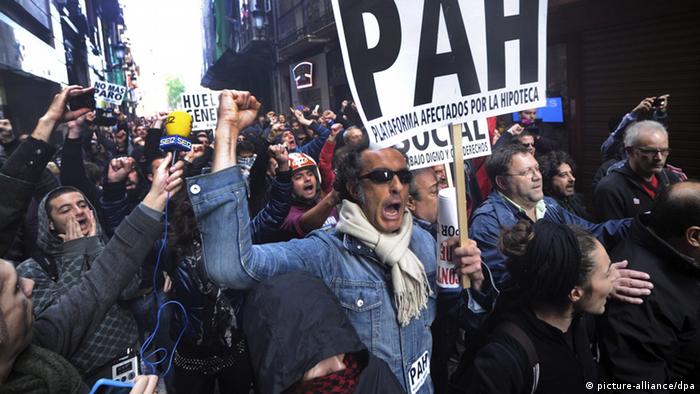
Disgruntled workers have marked their opposition to eurozone austerity
programs in a string of countries, most notably Spain and Portugal.
Police and protesters came to blows in Spain and Italy.
Strikes and protests hit Spain, Portugal, Italy, France, Greece and
Brussels on Wednesday, as workers mobilized under the umbrella
organization of the European Trade Union Confederation.
The most coordinated action took place in Spain and Portugal, where hundreds of planes and trains did not run, schools stayed shut and many factories were lifeless. In a sign of the level of disruption, power consumption in Spain was 16 percent below average as major factories sat idle.
Similar, smaller protests took place in France and Greece, as well as the EU's Brussels base, though the protests were accompanied by further gloomy economic figures that might cement the bloc's savings drive.
The protests also turned violent in the Spanish and Italian capitals.
Police said 110 people were arrested across Spain, mainly after picket line confrontations or in cases of damage to commercial property. Police used rubber bullets during one brief clash in central Madrid.
Some 60 protesters were arrested in Italy, after police and protesters squared off in Rome.
Mass demos, gloomy data
As the protesters took to the streets, the latest financial figures were rolling off the presses. Portugal and Greece, two countries that have already received emergency loans from their international partners, both suffered further economic setbacks in the July-September quarter.
Official figures showed that Greece's economy contracted by over 7 percent year-on-year in the three month period, while in Portugal the annualized contraction was put at 3.4 percent by the country's official statistics body, INE.
INE also recorded an increase in Portuguese unemployment, up to 15.8 percent from 15. Neighboring Spain is laboring with an even higher jobless rate, with around a quarter of the workforce seeking employment.
Many European governments, most notably in the debt-laden south of the bloc, are introducing various measures designed to bring their balance sheets back into line. Public sector wages, pensions, and spending on public services like hospitals and schools are among the victims of the attempts to rein in the debts.
Critics of the austerity measures, however, argue that they go too far - and could ultimately be counterproductive if they begin to have a knock-on effect on other areas of the economy.
msh/hc (AFP, dpa, Reuters)
The most coordinated action took place in Spain and Portugal, where hundreds of planes and trains did not run, schools stayed shut and many factories were lifeless. In a sign of the level of disruption, power consumption in Spain was 16 percent below average as major factories sat idle.
Similar, smaller protests took place in France and Greece, as well as the EU's Brussels base, though the protests were accompanied by further gloomy economic figures that might cement the bloc's savings drive.
Police said 110 people were arrested across Spain, mainly after picket line confrontations or in cases of damage to commercial property. Police used rubber bullets during one brief clash in central Madrid.
Some 60 protesters were arrested in Italy, after police and protesters squared off in Rome.
Mass demos, gloomy data
As the protesters took to the streets, the latest financial figures were rolling off the presses. Portugal and Greece, two countries that have already received emergency loans from their international partners, both suffered further economic setbacks in the July-September quarter.
Official figures showed that Greece's economy contracted by over 7 percent year-on-year in the three month period, while in Portugal the annualized contraction was put at 3.4 percent by the country's official statistics body, INE.
INE also recorded an increase in Portuguese unemployment, up to 15.8 percent from 15. Neighboring Spain is laboring with an even higher jobless rate, with around a quarter of the workforce seeking employment.
Many European governments, most notably in the debt-laden south of the bloc, are introducing various measures designed to bring their balance sheets back into line. Public sector wages, pensions, and spending on public services like hospitals and schools are among the victims of the attempts to rein in the debts.
Critics of the austerity measures, however, argue that they go too far - and could ultimately be counterproductive if they begin to have a knock-on effect on other areas of the economy.
msh/hc (AFP, dpa, Reuters)
沒有留言:
張貼留言